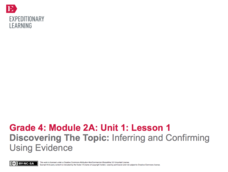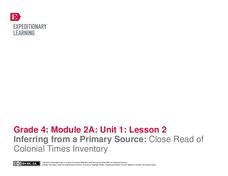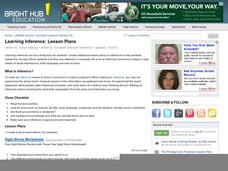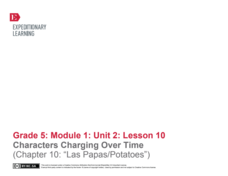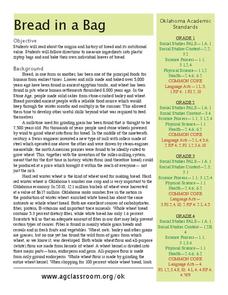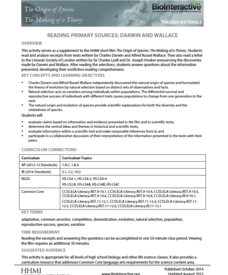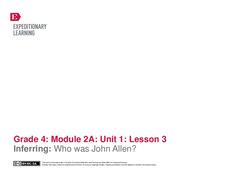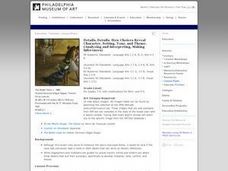EngageNY
Taking Notes Using a Graphic Organizer: Inferring About the Importance of Religion in Colonial America
Improve class understanding of colonial times by reading an informational text and filling out the accompanying graphic organizer. Class members work with a partner to read, take notes, make inferences, and synthesize information.The...
EngageNY
Discovering the Topic: Inferring and Confirming Using Evidence
Allow your class to figure out what they will be studying through an inquiry-based anticipatory set that involves analysis of mystery documents and practice with making inferences. The lesson plan document includes a detailed description...
EngageNY
Inferring from a Primary Source: Close Read of Colonial Times Inventory
Teach your class about colonial America through an examination of primary documents. First though, start vocabulary notebooks for content-specific and academic vocabulary. Pupils can keep this record during the entire module. Once this...
EngageNY
Inferring About Characters Based on How They Respond to Challenges (Chapter 4: "Los Higos/Figs")
How do you know what a character's personality is like if an author doesn't tell you? With a focus on character development in Esperanza Rising, pupils complete a jigsaw activity to analyze the actions of Mama, Abuelita, and Miguel. Once...
EngageNY
Mid-Unit 1 Assessment: Inferring with Pictures and Text
Mark the mid-point in the module with the authentic assessment described and provided here—the assessment and the unit focus on inferring using pictures and text. Pupils are given an image, a graphic organizer, and an article and must...
Curated OER
Questioning
Practice making predictions by looking at the cover of a book. You can use The Hungry Thing, as suggested here, or any other book you may be reading in class. Use the predictions to talk about good reading strategies. A chart is...
Curated OER
Caves
Explore caves with your class! Your scholars will participate in scientific observation, research, inference and deduction, reading, vocabulary, and writing activities about caves with this lesson plan. This resource contains five...
Curated OER
Learning Inference
Making inferences can be a tricky proposition for middle schoolers. In the lesson presented here, pupils practice the skill of drawing a conclusion and making a judgment - which are what making an inference is all about! There are five...
EngageNY
Characters Changing Over Time (Chapter 10: "Las Papas/Potatos")
Engage further in Esperanza Rising with a focus on close reading and metaphor. Class members zero in on the tenth chapter, examining characters and big ideas. Pupils discuss the text in small groups and as a whole class, and...
Curated OER
Bread in a Bag
Could the history of bread really be interesting? Yes, it could! An informational text gives scholars wheat production background from 8,000 years ago, discussing different types of bread and the current industry in Oklahoma. Learners...
EngageNY
Mid-Unit Assessment and Discussing Themes in Esperanza Rising: (Chapter 9: "Las Ciruelas/PLums")
Give this skills-based assessment halfway through your unit on Esperanza Rising. After a brief review, class members take the test, which asks them to show that they know how to analyze the novel independently. They are asked to...
EngageNY
Understanding Themes in Esperanza Rising
Determining a theme or central idea is greatly emphasized in the Common Core standards. Target that skill though big metaphors and central symbols in Pam Muñoz Ryan's Esperanza Rising. Help your class reach the standard through...
Howard Hughes Medical Institute
Reading Primary Sources: Darwin and Wallace
Take your classes back in time. Learners read real historical texts from both Darwin and Wallace as well as an announcement of their findings. Using guiding questions, they make inferences and draw conclusions from the information in the...
Curated OER
Poetry: An investigation of Life
AP English Language and Composition requires that class members be able to formulate an argument and support it. Use this resource to focus on the life of Emily Dickinson. It requires individuals to research her life and make inferences...
EngageNY
Inferring: Who was John Allen?
Help your learners work with difficult or archaic words. A continuation of lesson two of this module, the plan here focuses on deciphering the Inventory of John Allen, in particular the unfamiliar words that make up much of the list. Add...
Curated OER
Inferring Character Traits
Here is a lesson which is "flexible," and can operate as an individual or whole class activity. After reading a book of their choosing, with the use of a semantic map, learners identify character traits. They infer how their feelings...
Curated OER
Get a Leg Up
Traveling through space is an amazing experience, but it definitely takes a toll on the body. After reading an article and watching a brief video, learners perform an experiment that simulates the effects of zero gravity on the...
Curated OER
Arc GIS Project: Visualizing the Holocaust
A cross-curricular lesson for middle schoolers that covers language arts, social studies, geography, and math, this is a great extension activity if your class is reading The Diary of Anne Frank or learning about the Holocaust....
Curated OER
Details, Details: How Choices Reveal Character, Setting, Tone, and Theme. (Analyzing and Interpreting, Making Inferences)
Students respond to works of art. In this art interpretation lesson, students examine images of art while using concepts they learned as they read literary pieces. They detail the setting, characters, and the mood and theme of the works...
C3 Teachers
2020 Protests: Is There Anything New about the 2020 Protests?
Are marches and protests an effective form of resistance? That is the question high schoolers seek to answer in this inquiry lesson as they compare the 2020 protests to historical ones. Researchers use Venn Diagrams to compare images...
Curated OER
Learning From Leaves: From Observation to Inference
Students examine the adaptation of plants to their environments. They analyze and observe the structure, shape, and internal structure of various leaves, and make inferences about the structures.
Curated OER
How to "Read" an Artifact
Students discuss the types of information they can get from artifacts. In groups, they practice "reading" artifacts and determining their usage. They use inferences to test against official information about certain pieces. They also...
EngageNY
Contrasting Perspectives: Should the Farmworkers in Esperanza Rising Go On Strike? (Chapter 12: "Los Esparragos/Asparagus")
Explore multiple perspectives through a jigsaw activity that will improve your pupils' understanding of the characters in Esperanza Rising as well as their understanding of strikes and human rights. Tapping into prior knowledge, and...
NASA
The Big Climate Change Experiment Lesson 3: Climate Change Lines of Evidence
Consider the preponderance of evidence when making a verdict. The third of five lessons in Unit 1: The Big Climate Change Experiment focuses on the evidence for climate change. Learners study graphs, diagrams, and pictures regarding...

